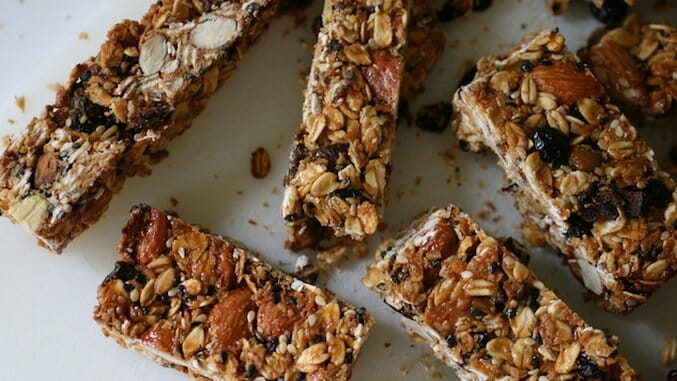
With diabetes and obesity running rampant in the US, it’s obvious that most Americans have poor diets, high in both sugar and fat. But the thing is, many Americans think they’re eating healthy. In a survey conducted by Consumer Reports, 90 percent of Americans surveyed reported eating a healthy diet. The same survey, however, showed that respondents “rarely” or “never” ate vegetables, and most had sugary drinks like soda and alcohol on a daily basis.
It could be that Americans simply don’t know what foods are good for them—and that’s not surprising considering how food is labeled, often misleadingly, in the United States. So which foods are healthy—and which are just candy bars with great marketing? Read on.
1. Granola Bars
From Nature’s Valley to ThinkThin, granola bars are often marketed as health foods, using terminology that invokes athleticism and the great outdoors. But the truth is that most granola bars are basically cookies, high in harmful ingredients like hydrogenated oils, sugar, and MSG. Great for a treat, but not-so-great if you’re actually wanting to cut your calories.
Instead, eat: Anything high in fiber (25 grams per day is ideal for women, while men need closer to 38) and low in sugar will satisfy your sweet tooth yet leave you feeling fuller for longer. HealthWarrior Dark Chocolate Coconut Sea Salt Protein Bar, for example, has a whopping 10 grams of protein, five grams of fiber, and over 15 percent of your body’s daily allowance of iron, calcium, and magnesium, which balances out the 11 grams of sugar in every bar.
2. Trail Mix
Trail mix is another one of those foods that you think are healthy. (It’s got the word ‘trail’ in it—like you’re hiking. That’s healthy, right?) But often trail mixes are packed with sugar and carbs, thanks to ingredients like chocolate chips, pretzels, and sweetened dehydrated fruit. Nuts, which can be healthy, are usually heavily salted in trail mix in order to complement the blast of sugar—and can contain high amounts of sodium and fat. Not exactly heart healthy.
Instead, eat: Trail mixes that are loaded with nuts and seeds, which contain Omega-3s and protein. Make your own at home with sunflower seeds, non-salted peanuts, and flax.
3. Packaged Deli Meats
Men and women should eat between 46 and 56 grams of protein per day, and more if they’re physically active. But while deli meat does contain protein, it can also contain heaps of salt and preservatives, something that can lead to heart disease. Additionally, processed meats like salami and bologna have been linked to an increase in colorectal cancer, according to the World Health Organization.
Instead, eat: Deli meats that are certified organic and preferably grass-fed. (These contain less chemicals, less preservatives, and routinely have higher amounts of healthful fatty acids.
4. Yogurt
It’s got calcium, probiotics, and protein. But is it healthy? Well, that depends. While yogurt has myriad health benefits and contains nutrients like vitamin C and D, the healthfulness really depends on the brand. One six-ounce container of Yoplait Strawberry Yogurt contains 26 grams of sugar. That’s more than a Twinkie!
Instead, eat: Plain Greek yogurt that’s high in protein and low in sugar. A six ounce serving of Fage Plain Green yogurt contains 100 calories, 18 grams of protein, and only seven grams of sugar. Much healthier.
5. Fruit Juices
They’re sugary. They’re delicious. And they contain fruit, so they’re healthy—right? Wrong. Smoothies contain a lot of sugar, and not a whole lot of protein or fiber—which means your insulin is going to spike, and you’ll find yourself hangry (hungry and angry) within the hour. The amount of sugar you’re going to find in a smoothie will depend on which fruits you use, and how many. But the stuff you’ll find at Jamba Juice, like a small sized Mega Mango smoothie, for example, contains almost as much sugar as a liter of Coke. Yikes.
Instead, drink: the green stuff. Anything with fruit is going to contain sugar. But you can balance out that sugar with healthy fats like coconut milk and avocado, or nutrient-rich greens like spinach and broccoli. And it still tastes delicious, even with the green chunks. Promise.
6. Canned Soups
Loaded with vegetables and broth, soups can actually be a carb-conscious, healthy meal choice. (Stay away from chowders, though, which can contain tons of salt and fat.) But canned soup, which is convenient and cheap, contains a chemical called Biphensol A, something that’s actually been linked to an increase in asthma, infertility, and even cancer.
Instead, eat: soup from scratch. Roasting and boiling bones from chicken or beef creates nutrient-dense stock. Throw in some vegetables and noodles, and you’ve got delicious healthy soup without the extra chemicals.
Image: Mariam, CC-BY
Sarah Watts is a freelance journalist based in Chicago.